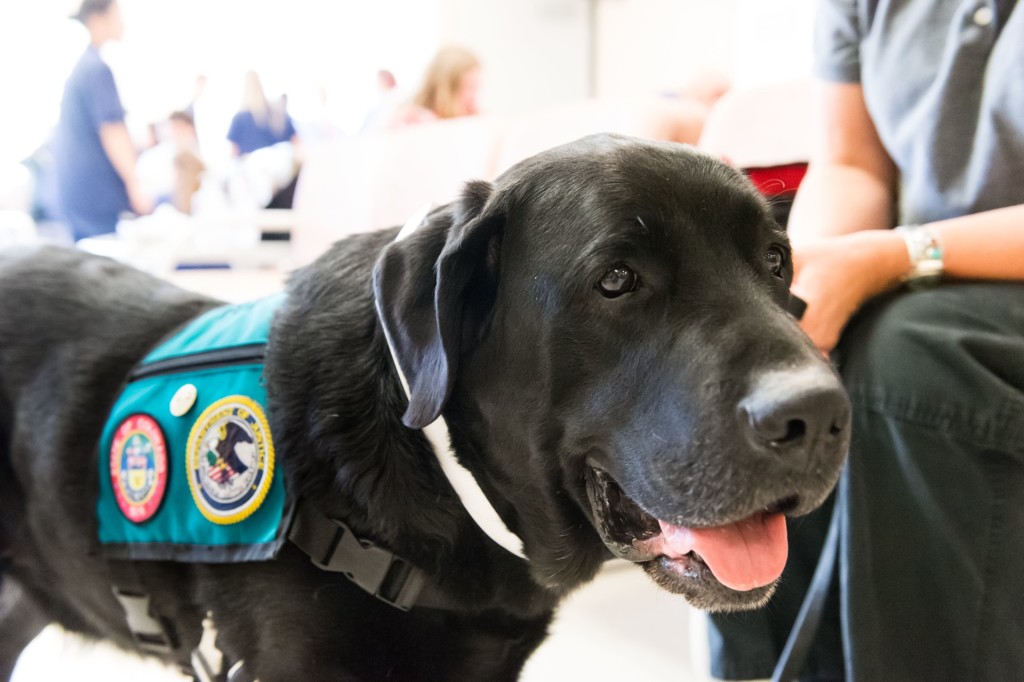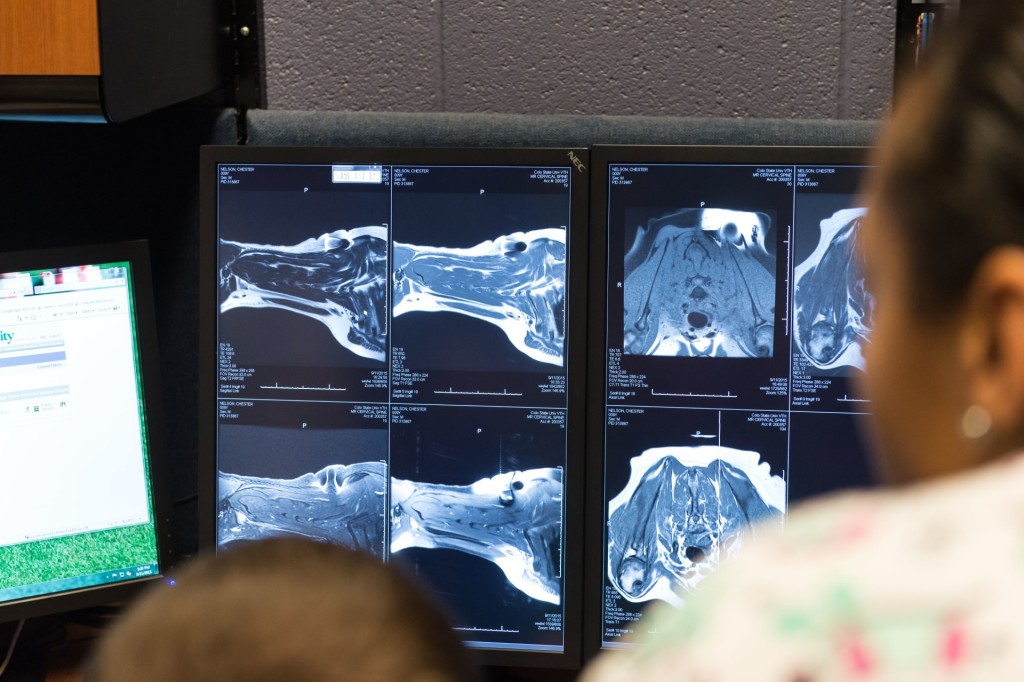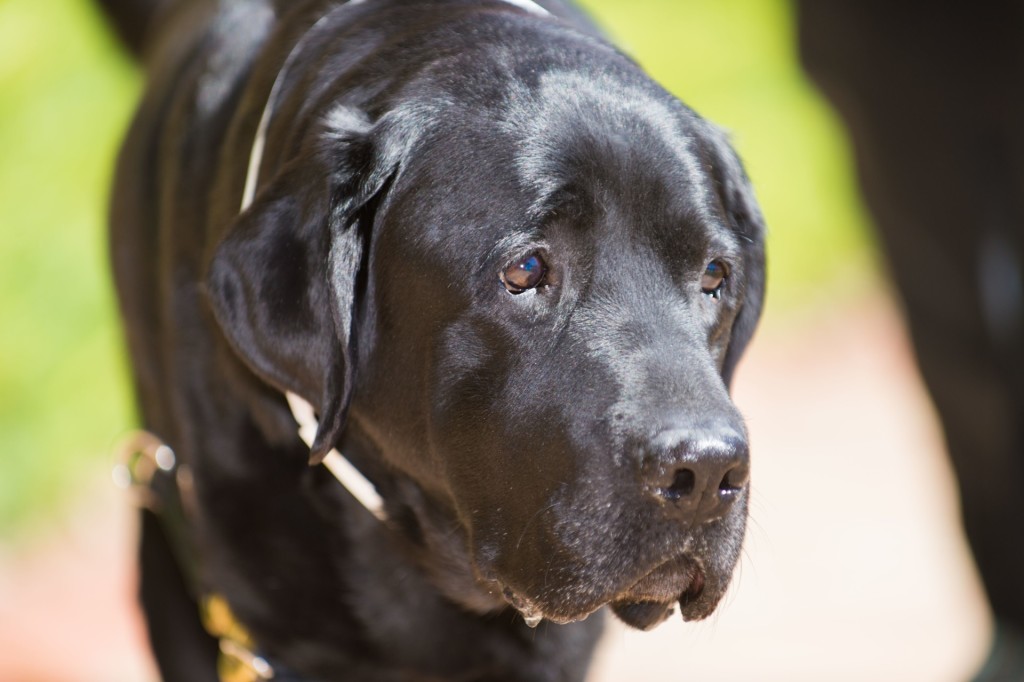A therapy dog named Chester, who spent 138 hours providing comfort to survivors during the recent Aurora theater shooting trial, switched roles from consoler to patient when he recently checked into Colorado State University’s James L. Voss Veterinary Teaching Hospital.
Experts in neurology, urgent care, imaging and anesthesiology collaborated to diagnose and provide a treatment plan for Chester, a 9-year-old Labrador retriever suffering from extreme neck pain. Diagnostic tests indicated that the beloved retriever has a spinal infection, which may be cleared with antibiotics, likely allowing Chester to avoid surgery.
“Chester lives his life to serve people. It meant so much to us to help return him to his normal self, and that’s really why I went into veterinary medicine.”
-Emily Kirkpatrick, veterinary student
“Chester lives his life to serve people,” said veterinary student Emily Kirkpatrick, who spent hours with Chester and his family at the hospital. “It meant so much to us to help return him to his normal self, and that’s really why I went into veterinary medicine.”
Providing support for trauma victims

Chester and four other dogs with Animals for Therapy spent the equivalent of 17 work days at the Arapahoe County Justice Center to console shooting survivors and the family members of victims during the grueling trial, said Kateri and Dean Nelson, owners of the nonprofit based in Golden. The trauma support team was present during every major event in the trial, including delivery of the verdict and formal sentencing of the assailant in late August.
“Before a person would testify, some of them would pet Chester. The person would testify and come back crying, and would cuddle up with Chester on the ground. The last day, we were right there in the hallway with the families when it was all over,” Kateri Nelson said.
Just five days after formal sentencing on Aug. 26, Chester developed terrible pain, “lying there and screaming,” Nelson said. Their veterinarian advised the couple that Chester could have a ruptured disk in his neck; they were referred to CSU’s Veterinary Teaching Hospital for diagnostic tests and possible surgery.
On September 10, Dr. Justin Mathis, a specialist in veterinary emergency and critical care, took radiographs of Chester with help from student Justine Barone.
“There is some narrowing of the intervertebral disc space at the cervical-thoracic junction, but this could be an infection,” Mathis said, analyzing the images made with X-rays. “Chester will need an MRI to know for sure.”

The state-of-the-art magnetic resonance imaging equipment at CSU provides detailed images of organs, bones and tissues in animal patients. “The MRI will allow us to see if Chester has a ruptured disk, or if there is an infection of the disk,” said Dr. Stephanie McGrath, a board-certified neurosurgeon and assistant professor of neurology.
The procedure gave McGrath and Kirkpatrick, a fourth-year vet student, an answer: The disk was not ruptured; it was infected and surrounded by inflamed muscles, the reason for Chester’s pain.
“It did reveal what we believe to be an infection of the vertebral column. It involves both the disk and the vertebrae,” McGrath explained.
She suggested that Chester take antibiotics for a full year, to ensure the cause of infection is eradicated.
Helping Chester return to caring for others
The MRI results helped McGrath identify three possible causes for Chester’s pain. Most likely, she explained, was infection of a disk and vertebral endplates, called discospondylitis, which occurs when fungus or bacteria enter the bloodstream and travel to the spine, causing infection. A less likely cause of the problem could be cancer or a foreign body, such as a grass awn (a sharp seed), that migrated to the spine, she said.
Irritated muscles, shown in the MRI, provided evidence for infection, the veterinarians said.

A surgical biopsy of the lesion in Chester’s neck would be needed for further confirmation, but the Nelsons “felt like treating the dog with antibiotics to monitor for response was the next, most appropriate step,” McGrath said.
After a month of antibiotic treatment, Chester will return to CSU for a check-up. If Chester does not improve, the Nelsons plan to move forward with the biopsy.
“We want to make sure we’re doing what’s best for Chester,” Dean Nelson said. “We know he’s in good hands at CSU.”
Chester was bred to be a hunting dog. But the Nelsons adopted him at age 2, and his loving disposition made clear that Chester was cut out for therapy work. He underwent training and now interacts most often with patients recovering from traumatic brain and spinal cord injuries.
“Chester is just a good ol’ boy,” said Kateri Nelson, an animal trainer, adding that Chester will return to therapy work as he heals. “I want him to continue doing what he loves to do – helping people.”
Media Assets
Video
Chester – Full package, nat sound
Photo
Click on photos in story to enlarge